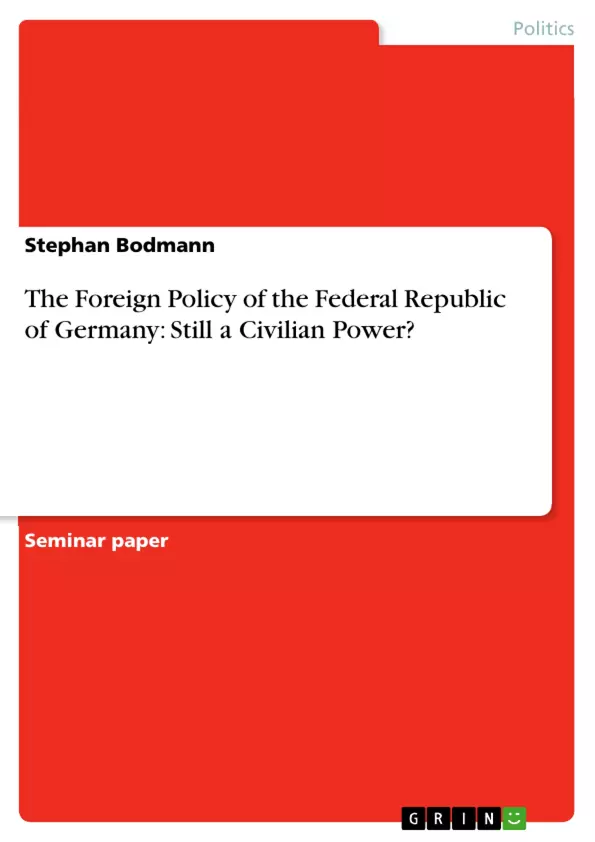Die Arbeit behandelt die Frage, ob die Außenpolitik der Bundesrepublik Deutschland nach wie vor als diejenige einer sog. "Zivilmacht" angesehen werden kann. Hierzu wird nach einer kurzen Einführung auf die Entstehungsgeschichte der Bundesrepublik sowie die Eigenschaften des "Zivilmacht"-Konzeptes eingegangen. Im Anschluss daran werden die entscheidenden Ereignisse beleuchtet, die zu der Erosion des "Zivilmacht"-Konzeptes geführt haben, insb. das deutsche Engagement im Kosovo (1999) und in Afghanistan, sowie das "Nein" zum Irakkrieg.
The essay deals with the question of whether the foreign policy of the Federal Republic of Germany may still be considered that of a so-called "civilian power". Following a brief introduction, the history of the Federal Republic and the characteristics of the "civilian power" concept are discussed. Subsequently, the decisive events that led to the erosion of the "civilian power" concept, especially the German engagement in Kosovo (1999) and Afghanistan, as well as the "no" to the war in Iraq make up the second part.
Inhaltsverzeichnis (Table of Contents)
- The Foreign Policy of the Federal Republic of Germany: Still a "Civilian Power"?
- Germany as a "Civilian Power": Historical Background
- Germany's Foreign Policy: The Post Cold War Era
- The Kosovo Crisis: A Test for the Civilian Power Model?
- The Use of Force: Defining Civilian Power
- The War on Terror: A New Challenge for German Foreign Policy?
Zielsetzung und Themenschwerpunkte (Objectives and Key Themes)
This essay aims to examine the state of German foreign policy since the end of the Cold War, focusing on the concept of "civilian power" and its evolution in the face of new global challenges. The essay considers both the historical traditions of the Bonn Republic as well as more recent developments following reunification, and it takes a critical look at the current definition of civilian power in political science.
- The historical development of German foreign policy as a "civilian power"
- The impact of German reunification on foreign policy goals and strategies
- The changing definition of "civilian power" in the context of new security threats
- The role of multilateralism and European integration in German foreign policy
- The relationship between the use of military force and the "civilian power" concept
Zusammenfassung der Kapitel (Chapter Summaries)
- The first chapter examines the historical background of Germany's foreign policy after World War II, highlighting the strong anti-militarist sentiment and the emphasis on European integration and multilateralism. It also discusses the core elements of "civilian power" as a guiding principle in German foreign policy.
- The second chapter explores the challenges faced by Germany's foreign policy in the post-Cold War era, particularly the role of the Gulf War and the growing international pressure on Germany to take a more active role in global security.
- The third chapter analyzes the Kosovo intervention of 1999, which represented a significant departure from Germany's traditional aversion to the use of military force. The chapter examines the decision-making process and the justifications for Germany's involvement in the conflict, considering the implications for the "civilian power" concept.
- The fourth chapter delves into the theoretical framework of "civilian power," analyzing the relationship between the emphasis on human rights, the rule of law, and the use of military force. The chapter explores the potential dilemmas inherent in the "civilian power" concept, particularly in situations requiring military intervention to prevent genocide or other atrocities.
- The fifth chapter analyzes Germany's foreign policy in the aftermath of 9/11, focusing on the country's involvement in the War on Terror, specifically in Afghanistan. The chapter examines the tensions between Germany's anti-militarist tradition and its commitment to international security cooperation, particularly in the context of the second Iraq War.
Schlüsselwörter (Keywords)
The key terms and concepts discussed in this essay include "civilian power," "anti-militarism," "multilateralism," "European integration," "human rights," "rule of law," "use of force," "post-Cold War," "Kosovo," "Afghanistan," "Iraq," "NATO," "Operation Allied Force," "Operation Enduring Freedom," "Bundeswehr," and "cheque-book diplomacy." The essay explores the historical, political, and theoretical dimensions of these concepts in relation to the evolution of German foreign policy.
Is Germany still considered a "civilian power"?
The essay discusses how events like the Kosovo engagement and Afghanistan have led to an erosion of the traditional "civilian power" concept.
What defines a "civilian power" in foreign policy?
It is characterized by an emphasis on multilateralism, human rights, the rule of law, and a strong aversion to the use of military force.
How did the Kosovo crisis affect German foreign policy?
The 1999 intervention was a significant test, as Germany used military force for the first time since WWII, challenging its anti-militarist tradition.
What role does multilateralism play for Germany?
Germany remains committed to international cooperation through NATO and the EU, even as its strategic goals evolve.
What was "cheque-book diplomacy"?
A term used to describe Germany's previous strategy of providing financial support for international crises instead of contributing military personnel.



